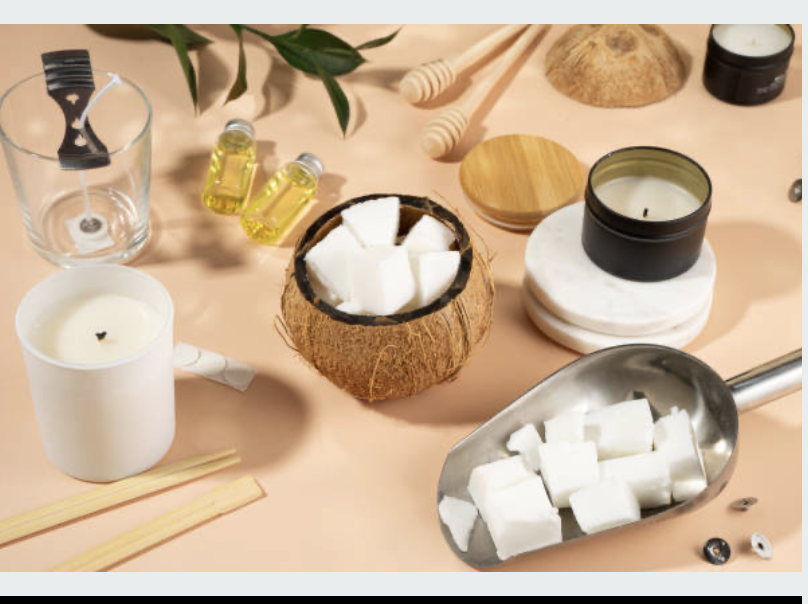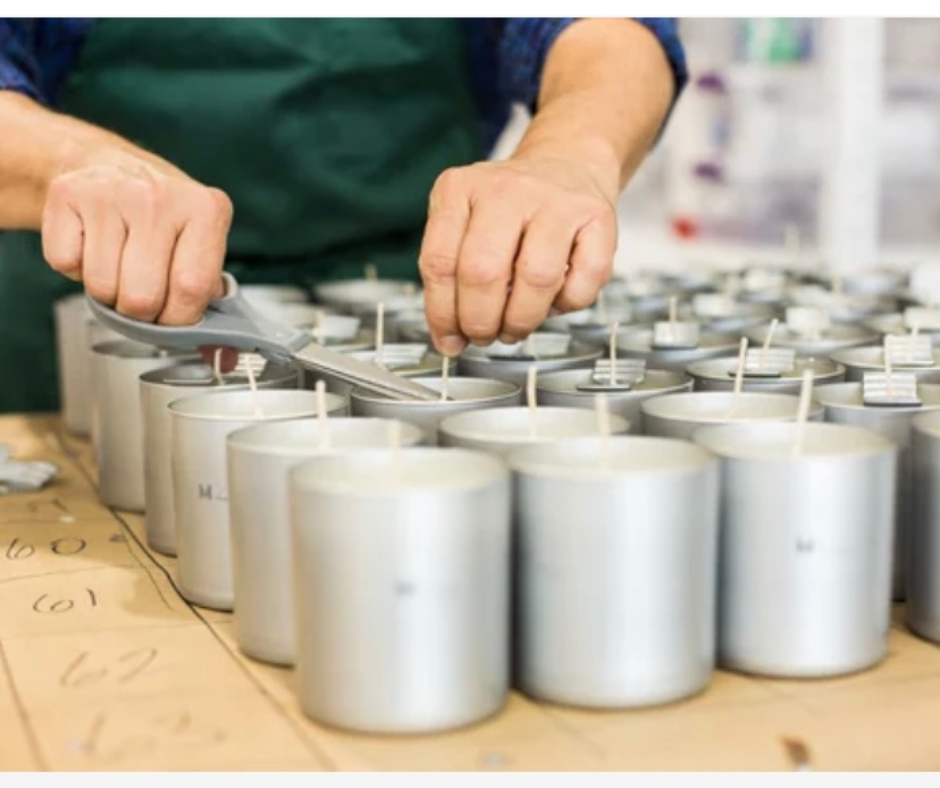It’s challenging to find a person who can oppose candles. It happens as they give a sense of relaxation, comfort, and well-being.

make a candle
This tutorial can teach any person how to make candles for personal use. This way, you would enjoy your DIY scented candle and save money. What’s more, you are free to start a candle-making enterprise.
Before determining what candlelights to produce, get some knowledge related to the topic. Exist many distinct fragrances, wicks, scents, and embellishments to select from. Fabricating candles at home may be straightforward, but if you employ the appropriate supplies.
So, let’s get deeper into the suggested topic!
Contents
- 1 What Materials Do I Require to Create My Candlelights?
- 2 Step-By-Step Guide On Making DIY Candles
- 2.1 Stage 1 – Containers Preparation
- 2.2 Stage 2 – Quantify the Substance
- 2.3 Stage 3 – Kindle the Soy Wax
- 2.4 Stage 4 – Append Some Aromatic Essences to The Melted Wax
- 2.5 Stage 5 – Position the Candle Wick
- 2.6 Stage 6 – Fix the Candle Wick
- 2.7 Stage 7 – The Candle Jar & Transfer The Wax Carefully
- 2.8 Stage 8 – Tidying Up After the Candle-Making Process
- 2.9 Stage 9 – Permit Your Recently Made Scented Candles to Mature
- 3 Final Word
- 4 Frequently Asked Questions
- 4.1 Is It Cheaper to Make Your Candles?
- 4.2 Can Any String Be Used As a Wick?
- 4.3 Can You Use Toothpick As a Candle Wick?
- 4.4 How Can I Reuse a Candle Without Wick?
- 4.5 How To Make Candle Wicks From Cotton Balls?
- 4.6 What Substance Is Candle Wax Made Of?
- 4.7 How Can You Make Your Candlelights Smell Stronger?
What Materials Do I Require to Create My Candlelights?
Here’s a summary of the candle-making kit you’ll require to create handmade candlelights:
- Wax
As a rule, wax comes in the form of shreds or flakes. Then you will melt them.

- Candle Wick
You won’t produce a candle if you don’t employ a wick.
Wicks could be paper or cotton. One of the most widespread wicks is cotton wicks. What’s more, wick size matters. The appropriate wick will guarantee even burn. - Fragrance Oils or Essential Oils
Fragrant candlelights extract their flavor from fragrance oils.
You could append aromatic or essential oils to the liquefied wax substance throughout the candle-making procedure. - Trowel
A heat-resistant trowel for blending substances will guarantee equable smelting. - Heat-Stable Container
Glass candle jars or cans serve as exceptional candle receptacles. - Dual Pot
Dual pots are culinary utensils that allocate stovetop heat for regulated warming.
They’re ideal for liquefying substances. You can utilize a ready-made double pot or a fashionable one. You could situate a metallic bowl atop this pot with a minor quantity of water at the base. - Temperature Gauge
Utilize a modern infrared or a culinary thermometer to measure the T of the wax. - Popsicle Sticks or pens
To create any sustainable wick while the wax hardens, utilize straight items.
These items also should be lightweight, such as popsicle sticks. - Paper Towels or Napkins
Avoid getting substance on all of your culinary washcloths!
Paper towels are perfect for wiping away the wax.
Step-By-Step Guide On Making DIY Candles
Crafting candles in the comfort of your home necessitates:
- a handful of specialized articles
- some careful organization
- a pinch of time
Here’s a step-wise guideline to walk any person through making candlelights.
Stage 1 – Containers Preparation
To begin with, acquire a usual votive container or a specialized one. Alternatively, glass jars or tin cans will also suffice.
Ensure your candle receptacles are immaculate and moisture is devoid, and position them on a level deck. Storage The below-mentioned things near:
- candle wicks
- oils
- chopsticks
- alternative candlewick options
Stage 2 – Quantify the Substance
Quantify the wax (by imbuing your candle receptacles with wax fragments or dwarfs)

candle wax
As wax dwarfs occupy more volume than liquid substance, utilize two candle receptacles worth of wax dwarfs per each candle container.
Stage 3 – Kindle the Soy Wax
Append the wax fragments inside your double boiler. Gently melt measured wax or wax fragments, utilizing the blending tool to mix the liquefying wax and add some fragrance oils later.

candle melts
Seize any fragments that ascend along all sides of the double boiler.
You should also know that:
- paraffin wax melts at 95 degrees F
- beeswax liquefies at 150 degrees F
Stage 4 – Append Some Aromatic Essences to The Melted Wax
You can use certain aromatic oils for candle crafting.

In such cases, adhere to the guidelines to reveal the potential of scent.
Stage 5 – Position the Candle Wick
Situate a single wick within every container. Secure the wick to the central base of the vessel by applying a droplet of wax onto the underside of the wick.

To get an equable burn, precisely center the foundation of the wick within the receptacle. Also, choose an appropriate wick to make a candle burn cleanly.
Stage 6 – Fix the Candle Wick
Position sticks or pens parallel to the upper of the candle vessel before you append the wax. Entrape the wick in two chopsticks between.
This technique would maintain the vertical position of the wick and even flame. Also, position the wick evenly.
Stage 7 – The Candle Jar & Transfer The Wax Carefully
Pour the warm liquid, imbuing candle containers. Let it hardly approach the edges.

Pour the wax gradually to decrease the formation of air bubbles. You should melt the wax and add more to the container to remove them. Also, locate your future candles with wicks on a flat surface.
Stage 8 – Tidying Up After the Candle-Making Process
Dried substances can present a challenge in the case of consequences removal. Employ paper towels to remove liquefied substances from the candle mold. Employ warm water to clean up the melted substance after making candles.
Stage 9 – Permit Your Recently Made Scented Candles to Mature
Soy wax candlelights solidify to ambient T in approximately 4 hours and fully mature in 3-4 days. Once the candlelight is dry, eliminate the pencils and trim the wick to make candles.

In case the masterpiece has solidified with blemishes, melt the wax. Then, apply a coat of melting wax on top to make your first candle. Now, burn your candle and enjoy even flame.
Final Word
We hope this manual on crafting candlelights has proven to be enlightening. You are free to create homemade candles or run the craft store now.
Frequently Asked Questions
Below you can find answers to the following.
Is It Cheaper to Make Your Candles?
Extravagant fragranced candles with wooden wicks may command prices exceeding one hundred dollars.
It’s cheaper to create candles with fragrance oil.
Can Any String Be Used As a Wick?
You cannot utilize any twine as a wick. Candle wicks necessitate absorbent fibers capable of absorbing the molten wax. So, it’s crucial to choose wicks correctly.
Can You Use Toothpick As a Candle Wick?
Toothpicks do not suffice as suitable candle wicks. The burning flame produced by a toothpick doesn’t generate enough heat to melt the entire surface of the candle.
How Can I Reuse a Candle Without Wick?
In this event, there are various ways to do it. You can utilize scented candles as:
small candles
container candles
pillar candles etc
How To Make Candle Wicks From Cotton Balls?
You can make thin cotton strings out of cotton balls. Pour the melted wax into the cotton wicks. Now, use your cotton wicks to make candles.
What Substance Is Candle Wax Made Of?
Paraffin is an extremely employed wax in modern times. Additionally, for candle-making, you could utilize different types, such as:
beeswax
palm wax
soy wax
gels
synthesized waxes etc
There are diverse types of wicks too.
How Can You Make Your Candlelights Smell Stronger?
To make a candle smell more, regularly trim the wick. The length of the wick should be eight inches longer than the vessel. Therefore, the scent will spread evenly.

3 thoughts on “Can You Make a Candle at Home?Easy to Follow 9 Comprehensive Steps”